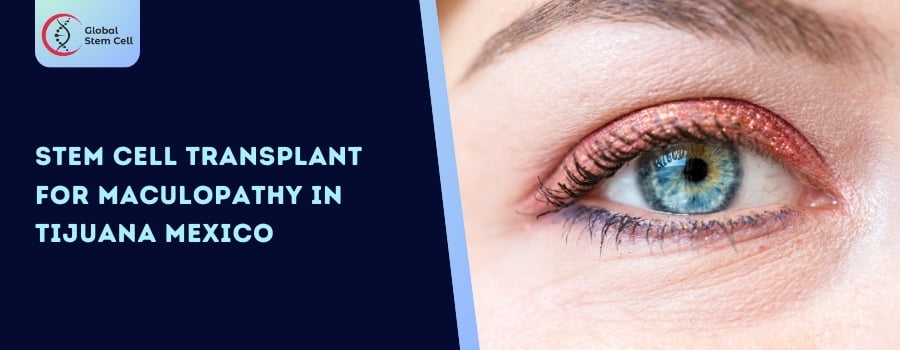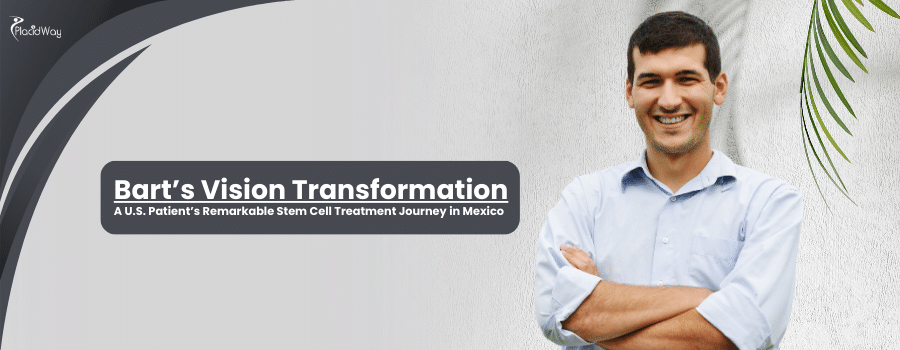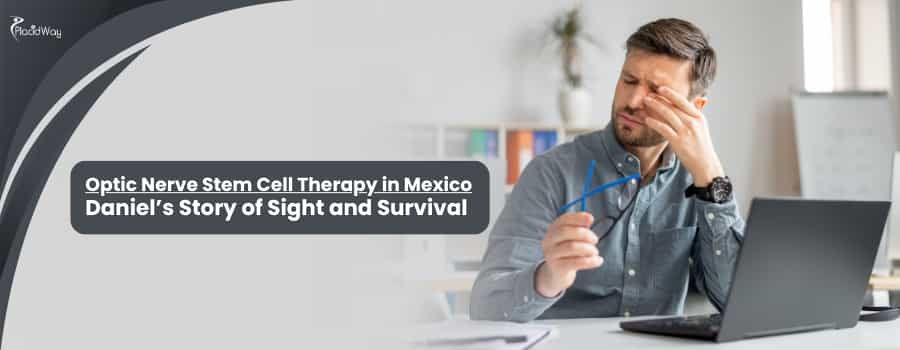
La maculopatía, también llamada degeneración macular, es un problema ocular muy grave. Afecta a la parte central del fondo del ojo, la mácula. Esto puede dificultar mucho la visión nítida, lo que dificulta cosas como leer, conducir e incluso reconocer las caras de las personas.
¿Busca clínicas de confianza de células madre en Tijuana?
La mayoría de los tratamientos para la maculopatía están pensados para ralentizarla, pero no la solucionan por completo. Pero ahora, terapia con células madre es un nuevo tratamiento que da esperanza. En esta entrada del blog, vamos a hablar de cómo la terapia con células madre puede ayudar, cómo funciona, y las cosas importantes a tener en cuenta si desea obtener este tratamiento en Tijuana, México.
Comprender la maculopatía
Contenido
La maculopatía incluye diferentes tipos de problemas que pueden dañar la mácula, como:
- Degeneración macular asociada a la edad (DMAE): La DMAE es la maculopatía más frecuente. Afecta sobre todo a las personas mayores. Hay dos tipos: la DMAE seca, que adelgaza la mácula, y la DMAE húmeda, que se produce cuando crecen vasos sanguíneos extraños bajo la retina y causan daños.
- Maculopatía diabética: Este tipo de maculopatía se da en personas diabéticas. Está causada por cambios en los pequeños vasos sanguíneos del ojo, que pueden provocar inflamación y daños en la mácula.
- Maculopatía miópica: Esta afección se da en personas con una miopía muy acusada. Se produce porque el ojo se alarga demasiado, lo que provoca daños en la mácula.
- Maculopatías hereditarias: Algunas personas nacen con genes que afectan a la mácula, como la enfermedad de Stargardt y la enfermedad de Best.
¿Qué es la terapia con células madre para la maculopatía?
La terapia con células madre es un tratamiento que utiliza células especiales para reparar y curar partes dañadas del cuerpo. En el caso de la maculopatía, la terapia con células madre se utiliza para intentar reparar o sustituir las células dañadas de la retina, ayudar a ver mejor y ralentizar o impedir el empeoramiento de la enfermedad. Los tipos de células madre que se utilizan son:
- Células madre embrionarias (CME): Estas células pueden convertirse en cualquier tipo de célula del cuerpo, incluidas las células oculares. Proceden de embriones muy tempranos.
- Células madre pluripotentes inducidas (iPSC): Se trata de células adultas que los científicos modifican para que puedan actuar como células madre embrionarias. También pueden convertirse en células oculares y son menos controvertidas que las CME.
- Células madre mesenquimales (MSC): Estas células proceden de tejidos adultos como la médula ósea o la grasa. Contribuyen a reducir la inflamación y pueden ayudar a reparar tejidos.
¿Por qué elegir Tijuana para la terapia con células madre?
Tijuana es un lugar popular para las personas que desean atención médica, incluida la terapia con células madre para la maculopatía. He aquí algunas razones:
- Cerca de Estados Unidos: Tijuana está cerca de la frontera con EE.UU., lo que facilita el acceso a los estadounidenses. Muchas clínicas de Tijuana ayudan a personas de otros países, lo que la convierte en una buena opción para recibir tratamiento.
- Instalaciones médicas de buena calidad: Tijuana cuenta con clínicas modernas con buena tecnología y médicos que siguen las normas internacionales.
- Médicos expertos: Los médicos en Tijuana están bien entrenados y saben mucho acerca de la terapia con células madre. Muchos han estudiado en EE.UU. y otros lugares avanzados.
- Tratamiento asequible: La terapia con células madre en Tijuana cuesta menos que en los EE.UU. y algunos otros lugares, pero la atención sigue siendo muy buena.
- Nuevos tratamientos: Las clínicas de Tijuana son conocidas por ofrecer los últimos y más avanzados tratamientos, especialmente en medicina regenerativa. Utilizan nuevos métodos para ayudar a los pacientes a recibir una mejor atención.
Clínica líder en células madre en Tijuana
ProgenCell es una conocida clínica de células madre en Tijuana, México. Ofrecen muchos tipos de tratamientos con células madre para ayudar a las personas con diferentes problemas de salud. La clínica utiliza principalmente células madre extraídas del propio cuerpo del paciente, como médula ósea o grasa. ProgenCell ayuda a las personas con diferentes condiciones, como problemas en las articulaciones, problemas nerviosos y enfermedades del sistema inmunológico.
Algunas cosas importantes sobre ProgenCell:
- Equipo experimentado: Los médicos y el personal de ProgenCell tienen mucha experiencia. Trabajan duro para asegurarse de que cada paciente recibe la mejor atención.
- Instalaciones modernas: La clínica cuenta con buena tecnología e instalaciones modernas para garantizar que los tratamientos sean seguros y funcionen bien.
- Atención completa: ProgenCell se ocupa de los pacientes desde la primera visita hasta la última. Elaboran planes de tratamiento adecuados para cada paciente.
- Centrarse en la seguridad y la calidad: La clínica sigue normas estrictas para garantizar que todos los tratamientos sean seguros y se hagan bien.
- Apoyo internacional al paciente: ProgenCell ayuda a personas de todo el mundo. Pueden ayudar con los planes de viaje y a encontrar un lugar donde alojarse.
El proceso de tratamiento
- Consulta y evaluación iniciales: En primer lugar, los pacientes se someten a un chequeo para determinar si la terapia con células madre es adecuada para ellos. El médico examinará sus antecedentes médicos, síntomas y tratamientos anteriores. Pueden realizarse pruebas como la OCT (un escáner ocular especial) para ver el grado de daño de la mácula.
- Plan de tratamiento personalizado: Tras la evaluación, el médico elabora un plan especial sólo para ese paciente. Este plan explica qué tipo de células madre se utilizarán y cuántos tratamientos son necesarios.
- Recogida de células madre: Si se utilizan las células madre del propio paciente, se extraen de la médula ósea o de la grasa. Si se utilizan células madre de donantes, proceden del tejido del cordón umbilical o de células madre embrionarias.
- Administración de células madre: Las células madre pueden administrarse de diferentes maneras:
- Inyección intravítrea: Inyección de las células madre en el ojo.
- Inyección subretiniana: Poner las células madre bajo la retina.
- Administración sistémica: Introducir las células madre en una vena y que viajen a la zona dañada.
- Cuidados postratamiento: Después del tratamiento, se vigila al paciente para asegurarse de que está bien. Hay visitas de seguimiento para comprobar si el tratamiento está funcionando y el médico puede sugerir otras cosas para ayudar, como vitaminas o ejercicios oculares.
Posibles beneficios de la terapia con células madre para la maculopatía
- Mejora de la visión: La terapia con células madre puede ayudar a reparar las células oculares dañadas, lo que puede facilitar la visión. Algunas personas dicen que pueden leer, ver caras y hacer otras cosas mejor.
- Ralentizar la progresión de la enfermedad: La terapia con células madre podría ayudar a ralentizar o incluso detener el empeoramiento de la enfermedad, de modo que las personas puedan conservar la visión que tienen.
- Mejor calidad de vida: Si mejora la visión, la gente puede hacer más cosas por sí misma, lo que hace la vida más fácil y mejor.
Consideraciones y riesgos
Aunque la terapia con células madre puede ser muy útil, hay cosas en las que pensar:
- Pruebas clínicas: La investigación sobre la terapia con células madre para la maculopatía aún está en curso. Es importante hablar con los médicos sobre lo que cabe esperar.
- Aprobación reglamentaria: Asegúrate de que la clínica que elijas sigue las normas adecuadas y tiene buenas prácticas.
- Variabilidad individual: Los resultados pueden variar de una persona a otra. Algunas personas pueden mejorar mucho y otras sólo un poco.
- Riesgos potenciales: Como cualquier tratamiento, puede haber riesgos, como infecciones o ausencia de cambios en la visión. Es importante que hable de estos riesgos con su médico.
Preguntas frecuentes
¿Cuánto cuesta la terapia con células madre para la maculopatía en Tijuana?
El coste suele ser menor que en EE.UU. u otros países, pero depende de la clínica y del tipo de células madre. Lo mejor es ponerse en contacto directamente con la clínica para obtener más información.
¿Cómo puedo elegir la clínica adecuada en Tijuana?
Busque clínicas con buenas críticas, médicos con experiencia y que cumplan las normas de seguridad.
¿Pueden los pacientes internacionales recibir terapia con células madre en Tijuana?
Sí, muchas clínicas ayudan a personas de otros países. También pueden ayudar con los planes de viaje y a encontrar alojamiento.
¿Está aprobada por los organismos reguladores la terapia con células madre para la maculopatía?
La terapia con células madre aún se considera experimental para la maculopatía. Es importante comprobar las credenciales de la clínica y asegurarse de que cumplen las normas.
¿Qué debo esperar durante la consulta inicial?
Los médicos examinarán su historial médico y le harán pruebas para ver si la terapia con células madre es adecuada para usted. También es un buen momento para hacer preguntas y obtener más información sobre el tratamiento.
Si estás pensando en la terapia con células madre para la maculopatía, habla con clínicas de confianza en Tijuana para saber más. La terapia con células madre podría ser una manera de ver mejor y vivir una vida más feliz.medicina generativa.





